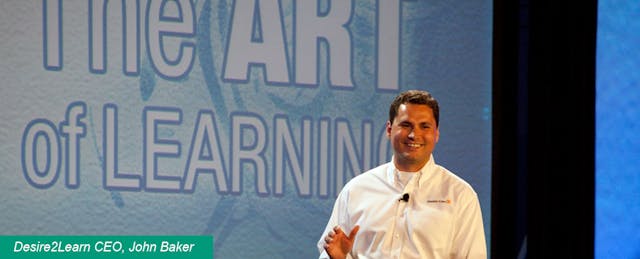Desire2Learn has been on a mission to re-define the “learning management system.” Founded in 1999 by John Baker--then a college student--Desire2Learn offers what is now commonly called a “LMS,” used by over 1,100 higher-ed, K-12, government and corporate institutions.
But Baker gets a little irked by those three letters; in fact, you’ll be hard-pressed to find them on the company’s website. The description he prefers is “integrated learning platform.” And today, the Waterloo, Ontario-based company is giving it a name: Brightspace.
“I dislike the term LMS because it only covers a small segment in what we do,” Baker told EdSurge back in October 2013. The words seem anachronistic to him; they refer to a time when the extent of most students’ experience with an LMS was limited to signing up for classes, downloading class materials and requesting transcripts.
With the technologies available today, Baker believes learning platforms can--and must--drive successful learning outcomes. “It’s all about providing the right data and tools to help students and faculty make the best decisions,” he says. “We’re giving students and faculty free the experience they’re looking for.” In an EdSurge op-ed, Baker contends that colleges "need to fulfill the implied promise that they made that the student will attain a degree."
Brightspace represents to Baker the "next evolution” of Desire2Learn’s integrated learning platform. The path to Brightspace can be traced to September 2012, when the company raised $80 million. Since then, Desire2Learn has acquired a slew of companies and integrated their technologies:
- Degree Compass (Jan. 2013)
- Wiggio (Mar. 2013)
- Knowillage (Sept. 2013)
- Achievement Standards Network (Mar. 2014; acquired from non-profit JES & Co.)
Baker tells EdSurge that there are “three main legs to our analytics strategy” in Brightspace, and here’s how the acquisitions fit:
-
Helping students make the right choices: Predictive analytics provided by Degree Compass will help drive course recommendations for students, based on how previous students with similar backgrounds and majors have performed. (Here's how it works.)
-
Offering solutions to help faculty drive student learning: Wiggio, a collaboration tool, lets instructors and students work together. The company also announced a partnership with IBM to implement Cognos, an analytics tool used by large enterprises to track business goals and performance. Baker says this tool will “help college faculty and administrators track student learning outcomes.”
-
Adaptive learning solutions: The company integrated Knowillage’s LEArning Path (LeaP) into its course platform to deliver adaptive content to students, based on their needs. The purchase of Achievement Standards Network will further let instructors map learning content to different national and state academic standards.
The company also announced a partnership with six major publishers--McGraw-Hill, Cengage Learning, Nelson Education, Pearson, Wiley and Macmillan--to make their digital textbooks available through Desire2Learn Binder, the company’s e-reader app that is available on iPad, Android devices and, starting today, Windows 8 machines.
Desire2Learn is not the only LMS provider attempting to deliver (or acquire) tools that improve driving student outcomes. The biggest player in this space--Blackboard-- bought MyEdu in January 2014 and, most recently, Perceptis. (Blackboard CEO Jay Bhatt told us there will be more deals throughout this year.) E-literate blogger Michael Feldstein says Blackboard is “trying to move up the value chain, away from being perceived as a software vendor and toward being perceived as a student success-related services vendor.” Instructure, creator of the Canvas LMS, recently announced a slew of partnerships to bring different digital textbook, video and collaboration services available to users.
As colleges come under increased pressure to deliver better student outcomes, so too will LMS providers need to provide more "advanced" data services and tools. The competition between the major players will only intensify: A recent analysis of LMS market share shows Blackboard still in the driver’s seat with 36% of U.S. higher education institutions; Instructure and Desire2Learn each have roughly 9%.


